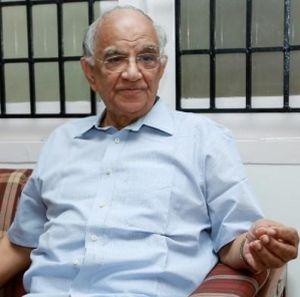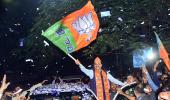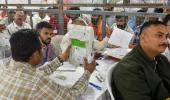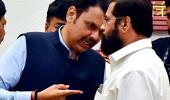'To attribute motives to the individual election commissioner or the Election Commission as a group is very unfair.'

Though we hear accusations against the Election Commission of India during and after every election, the voices became louder and stronger after the Maharashtra assembly elections.
Opposition leaders have expressed their lack of faith in the current Election Commission, calling it a 'partial body'.
Once again, the Electronic Voting Machine (EVM) is in the news.
Perhaps, after every election, you hear a clamour for going back to paper ballots.
But this time, it was a PIL filed by Dr K A Paul who wanted paper ballots to be back in India.
On November 26, the Supreme Court dismissed the PIL saying, 'If you win elections, EVMs are not tampered. When you lose elections, EVMs are tampered.'
Rediff.com's Shobha Warrier asked former Chief Election Commissioner Taruvai Subayya Krishnamurthy if the criticism of the Election Commission is valid.
Opposition parties have expressed their lack of trust in the Election Commission saying it is not fair and impartial.
Generally it has been the pattern, at least in India that during the election period, the Election Commission is subject to criticism for whatever decision taken by the body.
When the Election Commission takes a decision, it will be either favouring one party or the other. There is no midway at all.
If the decision is questioned rationally, it is understandable. But if it is questioned without any basis, it becomes very difficult to handle.
This kind of criticism is very common during the election period.
When we were the Election Commission in 2004, there were, in fact both personal attacks as well as attacks on the Election Commission's decisions.
I would like to particularly mention that the personal attacks were more due to prejudice than any logic.
For example, when the Election Commission is a collective body, how can a particular party criticise the individual election commissioner? This happened in my own case. I was bewildered by the criticism.
There have been other criticism also on the general decisions taken. For example, when we tried to bring polling officers to a particular state from the neighbouring state who knew the local language, the chief minister questioned how can you bring outsiders?
Then I had to explain to him that they were not foreigners but Indians working outside the state, and that it was only to improve credibility to the election system that we brought them. The chief minister kept quiet thereafter.
There are a number of such instances during my period that the election commission's decisions were questioned, or the chief election commissioner himself was accused of taking certain decisions.
It is not very uncommon in India. We are used to this.
The Election Commission doesn't have the contempt of court provision like in the judiciary even though the status is equivalent. So, the Election Commission has to pocket these insults and function.
The question is, is it fair or unfair?
I personally feel the public and the political parties have a right to criticise the decisions but to attribute motives to the individual election commissioner or the Election Commission as a group is very unfair.
So, my comment will be you are most welcome to criticise the decisions taken by the Election Commission. And if you have enough evidence, certainly go to court with an election petition and challenge it.
But vague allegations against the Commission or vague allegations against the individual election commissioner is not only unfair but needs to be positively condemned and criticised.

Do you feel only those who are in the Opposition criticise the Election Commission?
When we go back and look at the criticism, we see that the same political parties or leaders criticise the Election Commission when they are in Opposition, but it stops once they become the ruling party.
Generally that is the pattern though I am not in a position to statistically give a response.
My impression is that wherever there are complaints, it is motivated by the fear of losing the election.
I will give you one instance though I don't want to mention the name. During the Bihar election, a senior leader of a particular political party rang me up at 11 at night saying that the counting of votes must be stopped.
When I asked him why, he said that it was not fair to go ahead with the counting as there were reports of a lot of irregularities regarding the casting of votes.
When I asked him whether he had any evidence, he said they had only heard about people complaining about it.
I told him very politely that we would go ahead with the counting, and if he had any grievance about the result or the election, he could come back to me the next day and then I would consider taking action.
Lo and behold! That man got elected and he didn't come back the next day!
There are unfair criticisms and maybe some fair criticisms also.
After all, the Election Commission is a human institution and sometimes mistakes can happen. We are not error free. But to attribute motives to these decisions, in my opinion doesn't speak of political maturity.
We see ordinary people also talking about certain decisions taken by the Election Commission as favouring the ruling party.
Is this kind of feeling good for democracy?
It is certainly not good.
The ordinary person you are referring to may actually be a proxy for political parties.
In a democracy, these things are possible, and these things do happen. So, you cannot say ordinary people are criticising.
My own experience is there are proxies who are willing to criticise the Election cCommission or the decision taken by the Commission on some kind of a motivation for a political party.
I agree there may be some genuine criticism as well. I am not denying that.
But the point is, can we go by vague criticisms of individuals or parties?
We are supposed to be living in a country where the rule of law is practised.
If you have genuine evidence or proof against the credibility of the Election Commission's decision, you have a legal route open to you.
But without going through that, and straightaway going for street protests or condemning the Election Commission, in my opinion, doesn't augur well for the credibility of the election or the smooth functioning of the election process.

Do you get the feeling that people are losing faith in the Election Commission?
Certainly not! I do not think so. I do agree that there is more criticism than probably it was earlier.
But then in a democracy, voices of protest, voices of admiration or voices of appreciation can be heard.
There might have been some errors in some decisions, but you have to look at the facts before saying whether they have affected the credibility of the institution.
They monitor elections in more than 10,000 polling booths. They have to depend upon outside agencies like the state police, the central paramilitary forces, etc. They have to also depend upon, for example, state officials for the polling stations.
There are sometimes mistakes, there are sometimes criticisms.
But I cannot agree with the view that it is affecting the credibility of the institution.
When you were the chief election commissioner, did you experience any pressure from the ruling party?
Never. I never had any pressure from any quarters.
Not just that, the Election Commission as a collective body always took decisions unanimously.

Once again, the debate on whether we should have paper ballots instead of EVMs has started.
EVMs were first introduced in a big way in 2004 when you were the election commissioner. With complaints of discrepancies coming from so many quarters, should we go back to paper ballots?
When paper ballots were vogue in India, in states like Bihar, Bengal and some other states, a lot of bogus ballots were printed and stuffed into ballot boxes.
In fact, some leading political figures were involved in this manipulation.
It is much more easy to manipulate election results by booth capturing and ballot capturing than EVMs.
The electronic voting machine is not an Internet linked operation. It is independent by itself. And it has so many advantages.
For example, it saves so much of time. Secondly, there is no invalid vote in electronic voting machines while it is possible in the manual system of voting. Thirdly, tonnes of papers are saved.
If you want to suggest improvement in the use of technology, certainly, you are most welcome.
The Election Commission has given ample opportunities to political parties even in my time. The Supreme Court has given more opportunities to political parties to prove the lack of credibility of these machines. But none of them has been able to prove that (the machines could be manipulated).
 IMAGE: T S Krishnamurthy.
IMAGE: T S Krishnamurthy.Most countries in the world use paper ballots. Some even tried EVMs and went back to paper ballots...
Just because other countries use ballot papers, do you want to say that it is the ideal system for India, a country where there is a huge voter population? It is certainly not a convincing argument for me.
But to say that the conventional ballot paper system is superior, I am afraid, it only speaks of ignorance and misinformation.
Brazil is using electronic voting machines, and there has been no complaint against it there. In fact, it has been going on for decades.
Just because smaller countries with smaller populations are using paper ballots, we need not.
For your information, when I was the election commissioner, many countries, particularly South Africa and Singapore, showed great interest in our electronic voting machine.
All that I would say is if you want to suggest improvement in the electronic voting machine, please suggest. We will certainly improve it. But do not ever go back to ballot paper.
Feature Presentation: Aslam Hunani/Rediff.com










